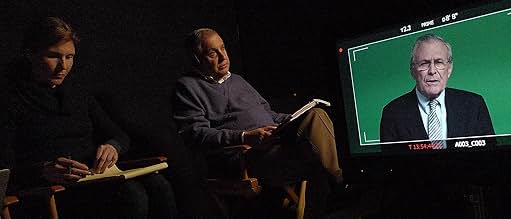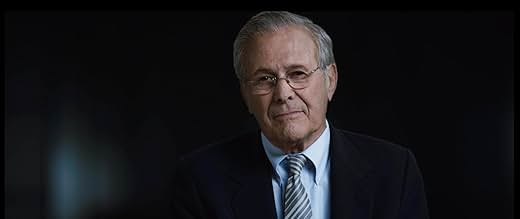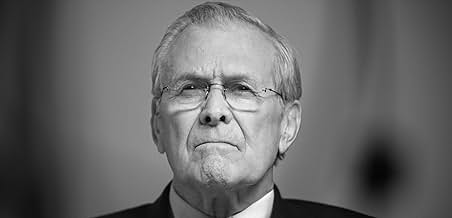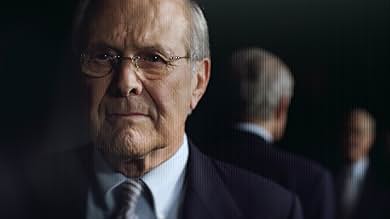ÉVALUATION IMDb
7,0/10
4,3 k
MA NOTE
Ajouter une intrigue dans votre langueFormer United States Secretary of Defense, Donald Rumsfeld, discusses his career in Washington D.C. from his days as a congressman in the early 1960s to planning the invasion of Iraq in 2003... Tout lireFormer United States Secretary of Defense, Donald Rumsfeld, discusses his career in Washington D.C. from his days as a congressman in the early 1960s to planning the invasion of Iraq in 2003.Former United States Secretary of Defense, Donald Rumsfeld, discusses his career in Washington D.C. from his days as a congressman in the early 1960s to planning the invasion of Iraq in 2003.
- Director
- Writer
- Stars
- Prix
- 2 victoires et 9 nominations au total
Histoire
Le saviez-vous
- AnecdotesThis same director also made Fog of War, a similar film that featured an extensive interview with Vietnam-era Secretary of Defense, Robert McNamara. Both films were highly critical of their lead subjects management of war.
- Générique farfeluIvan & Boris
- ConnexionsFeatured in At the Movies: Venice Film Festival 2013 (2013)
- Bandes originalesWhite Christmas
Written by Irving Berlin
Performed by Tennessee Ernie Ford
Courtesy of Capitol Records Nashville under license from Universal Music Enterprises
Commentaire en vedette
"There are known knowns; there are things we know that we know. There are known unknowns; that is to say, there are things that we now know we don't know. But there are also unknown unknowns - there are things we do not know we don't know." This was the enigmatic quote from American politician Donald Rumsfeld that inspired the title of this interview by acclaimed documentary maker Errol Morris. Rumsfeld had an astonishing career working for no fewer than four US presidents and serving twice as Secretary of State for Defense - once as the youngest holder of the position (1975- 1977) and then later as the oldest holder of the post (2001-2006). In his second term as Defense Secretary, he was a principal architect of the so-called 'war on terror', sending troops into Afghanistan and then Iraq.
The fascinating testimony presented by Morris is both written and oral. Rumsfeld was famous for his blizzard of memos - known as "snowflakes" - and Morris managed to gain access to all the unclassified ones and to persuade Rumsfeld to read out the most relevant to the documentary. Additionally Morris posed a series of searching questions in an interview shot over 11 days and recorded using the film maker's trademark "Interrotron" device which means that Rumsfeld is seen staring straight into the camera. It has to be said that Rumsfeld is a fluent writer and an articulate speaker and, after eight decades, is as sharp as ever, so there is no revelatory moment like David Frost's interview with Richard Nixon, but it is precisely his evasiveness and the charming manner in which he accomplishes this that is so revealing of a bizarre and (when given power) frightening character.
I saw "The Known Unknown" at its UK premiere in central London's Curzon Soho cinema in the presence of Errol Morris who made some opening remarks and then, after the screening, took a question & answer session. He compared this documentary with "The Fog Of War", his 2003 interview with another US Defense Secretary when he questioned Robert McNamara on the Vietnam war, and called the two films "bookends". He noted that McNamara was "deeply reflective", but characterised Rumsfeld's performance as "deeply unreflective". He called Rumsfeld "a skillful obscurantist" who was "obsessive with language" and had "a complete lack of irony", highlighting his "infernal grin".
The banality of much of Rumsfeld's language - "The absence of evidence is not the evidence of absence" - reminded me of Peter Sellers' penultimate film "Being There" (1979) in which he played a simple gardener whose bland aphorisms about nature led to him being co-opted by America's political power brokers. Morris has done us a service in capturing all this for history in the hope that we can learn from history. What is totally unclear is why Rumsfeld agreed to the interview. This was Morris's last question to him and he responded: "I'll be darned if I know".
The fascinating testimony presented by Morris is both written and oral. Rumsfeld was famous for his blizzard of memos - known as "snowflakes" - and Morris managed to gain access to all the unclassified ones and to persuade Rumsfeld to read out the most relevant to the documentary. Additionally Morris posed a series of searching questions in an interview shot over 11 days and recorded using the film maker's trademark "Interrotron" device which means that Rumsfeld is seen staring straight into the camera. It has to be said that Rumsfeld is a fluent writer and an articulate speaker and, after eight decades, is as sharp as ever, so there is no revelatory moment like David Frost's interview with Richard Nixon, but it is precisely his evasiveness and the charming manner in which he accomplishes this that is so revealing of a bizarre and (when given power) frightening character.
I saw "The Known Unknown" at its UK premiere in central London's Curzon Soho cinema in the presence of Errol Morris who made some opening remarks and then, after the screening, took a question & answer session. He compared this documentary with "The Fog Of War", his 2003 interview with another US Defense Secretary when he questioned Robert McNamara on the Vietnam war, and called the two films "bookends". He noted that McNamara was "deeply reflective", but characterised Rumsfeld's performance as "deeply unreflective". He called Rumsfeld "a skillful obscurantist" who was "obsessive with language" and had "a complete lack of irony", highlighting his "infernal grin".
The banality of much of Rumsfeld's language - "The absence of evidence is not the evidence of absence" - reminded me of Peter Sellers' penultimate film "Being There" (1979) in which he played a simple gardener whose bland aphorisms about nature led to him being co-opted by America's political power brokers. Morris has done us a service in capturing all this for history in the hope that we can learn from history. What is totally unclear is why Rumsfeld agreed to the interview. This was Morris's last question to him and he responded: "I'll be darned if I know".
- rogerdarlington
- 17 mars 2014
- Lien permanent
Meilleurs choix
Connectez-vous pour évaluer et surveiller les recommandations personnalisées
- How long is The Unknown Known?Propulsé par Alexa
Détails
- Date de sortie
- Pays d’origine
- Langue
- Aussi connu sous le nom de
- Donald Rumsfeld: certezas desconocidas
- sociétés de production
- Consultez plus de crédits d'entreprise sur IMDbPro
Box-office
- Brut – États-Unis et Canada
- 276 497 $ US
- Fin de semaine d'ouverture – États-Unis et Canada
- 64 315 $ US
- 6 avr. 2014
- Brut – à l'échelle mondiale
- 301 604 $ US
- Durée1 heure 43 minutes
- Couleur
- Mixage
- Rapport de forme
- 2.35 : 1
Contribuer à cette page
Suggérer une modification ou ajouter du contenu manquant

Lacune principale
By what name was The Unknown Known (2013) officially released in Canada in English?
Répondre























